Elimination Communication: Can Your Baby Go Diaper Free? with Andrea Olson
- What exactly elimination communication means
- How Andrea began her love of teaching other parents this method
- Possible benefits of going diaper free

LISTEN TO THIS EPISODE
Episode Description
Did you know babies can potty from birth? I had no idea until my guest Andrea Olson from @godiaperfree came on the podcast to educate us about Elimination Communication (EC). EC is a gentle, non-coercive way to respond to a baby’s natural hygiene needs...and Andrea is the diaper free GURU here to teach us how and why!
Just like babies have the desire and ability to feed themselves solid food when the time is right, babies are instinctual when it comes to pottying. Andrea argues that pottying your baby can make baby-raising cleaner, easier, MUCH more connected to you plus it’s better for the environment. If you think a self-feeding baby sounds exciting, I think you’ll love hearing about your self-pottying baby’s potential too!
About the Guest
- Andrea Olson is the director of DiaperFreeBaby.org and creative director of the Go Diaper Free Certified Coach Training Program. She is a mom of 5 and also has a line called Tiny Undies, a company that offers small and gender-neutral underwear to parents of babies and toddlers in sizes 6 months to 5T. Andrea is the author of a number of books and lives a diaper free passionate life with her kids in North Carolina.
Links from this Episode
- Go Diaper Free: Andrea’s website teaches how to use the Elimination Communication technique with babies
- Tiny Undies: Company which offers small and gender-neutral underwear to parents of babies and toddlers in sizes 6 months to 5T
- Her books:
- Go Diaper Free: A Simplified Handbook for Elimination Communication for babies 0-18 months
- The Tiny Potty Training Book: A Simple Guide to Non-coercive potty training
- Tiny Potty: a learning board book for babies 6 months and up
- Night Potty: a before-bedtime board book for babies 6 months and up.
- Brave New Birth
- Baby-Led Weaning with Katie Ferraro program with the 100 First Foods™ Daily Meal Plan, join here: https://babyledweaning.co/program
- Baby-Led Weaning for Beginners free online workshop with 100 First Foods™ list to all attendees, register here: https://babyledweaning.co/baby-led-weaning-for-beginners

Latest Episodes
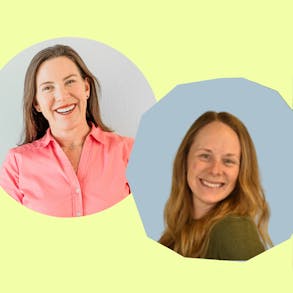
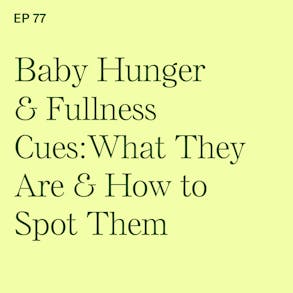
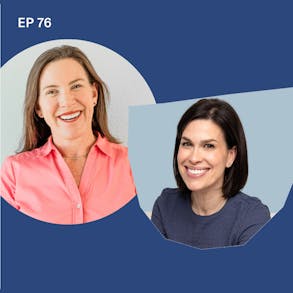
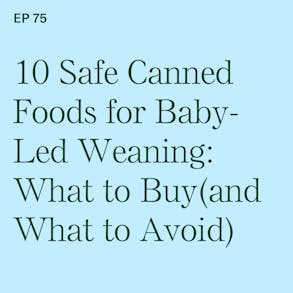
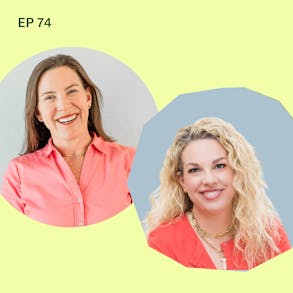
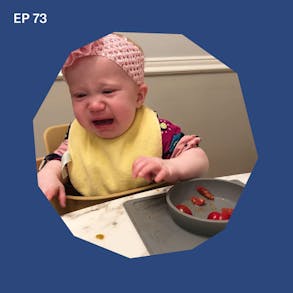
Andrea Olson (1s):
Yeah, we use diapers as a backup. So diaper free does not mean not using diapers. Diaper free means you're not using it as a toilet. You're free from the conventional way of diapering, which is stick it on them. This is their toilet. They know nothing else.
Katie Ferraro (14s):
Hey there. I'm Katie Ferraro registered dietitian college nutrition, professor and mama of seven specializing in baby led weaning here on the baby led weaning made easy podcast. I help you strip out all of the noise and nonsense about feeding, leading you with the competence and knowledge you need to give your baby a safe start to solid foods using baby led weaning. All right. Hi, Andrea. Thank you so much for joining me today.
Andrea Olson (43s):
Hello. Thank you for having me.
Katie Ferraro (45s):
I have been dying to interview you since I got introduced to you and Elimination Communication, which I think is like maybe the strangest thing after baby LED WEANING or perhaps more strange, the baby led weaning. And I mean, no disrespect your field, but like tell us what Elimination Communication is. Cause I think it's wild. If it's true that it's really possible.
Andrea Olson (1m 3s):
It is so possible. I've done it with all five of mine. And we will definitely talk about that. Probably. I think we call it EC for short. So basically it's infant potty training. You're not relying on diapers as a toilet from as early as birth, but people do it between zero and 18 months. And it's all based on instincts. So similar to baby led weaning. You've got a baby who is developmentally ready to do certain things at certain ages, newborns come out and they put in a diaper and then they cry and cry and cry because they want you to take it off and potty them in a hygienic way. They don't want to be on themselves. They don't want to poop on themselves, certainly not the second one. And they try to tell you, and you're like, oh, let me try the breasts.
Andrea Olson (1m 46s):
And they pop off of it. Oh, let me see you. Maybe you're tired. And they rock you and Shushu by the time a parent figures out why the baby's screaming their head off, they look in the diaper and say, oh, you're wet. Or you're you have a poopy diaper. That's why you're crying. But if you back up a few steps, they were actually crying to get you to take it off. So this is all built around this premise, that humans and that actually all mammals are born with these super strong instincts to keep them free from all sorts of diseases, by insisting that they go away from you, their bed and themselves. So we just are born with this very strong desire for hygiene.
Katie Ferraro (2m 22s):
So I know you as the easy person, where did you learn about this
Andrea Olson (2m 26s):
Before I ever had kids, actually, when, I didn't know if I was going to have kids, I heard of a friend of a friend who had a baby, like one of the first in our community, out in California and they didn't use diapers. They just had her pee in the sink. And I was like, whatever that is, that sounds great. Compared to when I was 11 and 12 and 13 and babysitting and having to change all these poopy diapers, I was like, whatever they're doing with their new baby, I'm going to figure that out. If I have kids. And sure enough, when I got pregnant, like three years later, I looked it up and I found a book on it and I've read it like four times. And when my baby came, I spent a couple of weeks and months trying to figure out how to do that. Cause if that was true, that they were asking for my help, then I felt like I would be a bad parent if I didn't try to provide that for my first son.
Andrea Olson (3m 11s):
And it worked instantly, like, it was just amazing. So I tried to find people who also did it as well. And I found a few, but they were super disorganized. So anyway, I ended up going down the path of geeking out on it and learning as much as I could from obscure resources and eventually writing my own book, of course, cause I'm that kind of a Virgo. So
Katie Ferraro (3m 32s):
You do it with all five of your kids and did it work like the same each way? Cause I know like I did not do baby led weaning with my oldest than I did with my quadruplets. But by then I had a system when I did it with my twins. I kind of tweaked it each time. Like, did you do that? Or do you like set the way you're going to do it and do it with all five kids before you kind of went into this professionally?
Andrea Olson (3m 48s):
I started with my son and I wrote my book when he was five months old. And then when he was 12 months old, I finished it and started selling my book. So I was figuring it out and other people were asking me, how did you do that? What are you doing? Why do you keep getting up in the middle of yoga with our babies and disappearing for a little while? And I was pottying him. So I did that from the beginning. I never knew that whole phenomenon of waiting for them to fill up their diaper or smelling their diaper, to see if they were full and changing them. Like my other four children. I started at birth with them as well. I figured why not work with nature instead of against nature from the beginning? So yeah, all five of mine were out of diapers by walking. None of them had to be potty trained and all of them pretty much pooped in the potty from birth.
Katie Ferraro (4m 33s):
But when you say Out of diapers, if they were never in diapers, how to get out of diapers or my misunderstanding. Yeah. We use
Andrea Olson (4m 39s):
diapers as a backup. So diaper free does not mean not using diapers. Diaper free means you're not using it as a toilet. You're free from the conventional way of diapering, which is sick it on them. This is their toilet. They know nothing else. So back in the fifties and before in the United States, our grandparents and great-grandparents would have them in a diaper until they were walking and then they didn't want to wash them anymore. So anything they got between zero and 12 months in a toilet or somewhere other than the diaper was bonus points. But at about 12 months, they stop using diapers too. And so technically they were using them as a backup. Like we use them with EC as a backup and nomadic tribes, across history or in cold weather, they would use something inside the sling or the wrap or the papoose to absorb anything until they took them out of that.
Andrea Olson (5m 27s):
So there's always been some kind of a form of a diaper, I think, except for in hot areas, they didn't need them. So when we're in the modern world, yeah, we're going to use it as a backup because we don't want that everywhere. And actually the backup encourages them to hold it more and to signal more strongly. So we use it as a tool like it's brilliant and why not? Okay.
Katie Ferraro (5m 47s):
The baby led weaning, like it's one of the few things that appeals to a second time parent, like they do traditional spoon-feeding they get a picky eater with her first kid. The next time they're like interested in figuring this out. I don't, from a personal standpoint, I had seven kids in three years. At one point we had six kids in diapers. Like I was just dying from a financial standpoint. So I get the point that you saved money. Like with baby led weaning, you save money. If you make your own food, you're making it for yourself. Just make it for the kids as well. But in addition to saving money from not buying diapers or as many diapers, are there other benefits of teaching babies at such a young age, how to potty hygienically and apologies if I'm using the wrong language,
Andrea Olson (6m 25s):
That's great language. You've got it. I've never had more than one in diapers. And I should have had four in diapers at one point. So I get you and I feel bad that you didn't know about this.
Katie Ferraro (6m 33s):
I know I found you after just too
Andrea Olson (6m 35s):
Late. Oh, it's okay. Now you can tell everybody else about it.
Katie Ferraro (6m 39s):
That's why you're on the podcast. Like I can't believe that this is the thing I like. I have to meet her in real life and see if it's true, but what are the benefits?
Andrea Olson (6m 45s):
Yeah. So most parents do it. Part-time about 55% of buy my surveys, which means they're not doing it all day every day. So one of the benefits that everybody says is connection. So you might feel completely incompetent as a new parent, especially as a new mom and like everything is new and it's overwhelming. Being able to depend on nature to provide you with this amount of success. Like you catch a pee in the body or a poop in the potty and you didn't have to wipe it out of every crevice known to man. It is amazingly it's confidence building. So you become a better parent from the get-go more connected, the connection between you when they see that you're listening and they start to communicate to you around a couple of weeks old and look to you for help.
Andrea Olson (7m 26s):
It's like, it just warms your heart. So that's kind of like a intangible thing, right? Other than that though, you save time. So you're not changing, endless diapers, your house smells better. I've never owned a diaper pail, a diaper genie or whatever. You're saving the environment. So nobody really seems to ultimately care about this. Unfortunately they say they do, but when the rubber hits the road, they're like, I'd rather use diapers because they're convenient. Well, if you're out of diapers between 12 and 18 months, which is what the Montessori school of thought says, is this sort of period for getting out of diapers. Like that's when children are completely like down to do the steps to finish, like they're completely motivated and you're out of diapers, you are saving all of those from going into the landfill.
Andrea Olson (8m 10s):
They never biodegrade. I don't think they ever will. They say 500 years. They're all full of poop and pee and chemicals that I imagine someday will off gas and kill us all is a huge problem. Waste management cannot figure this one out. And it's the third largest item in our waste stream. 27 billion gets thrown away in our country alone and landfills are filling up. So if you want your child to have a planet to live on, you know, then maybe that's kind of what could guilt you into trying EC, but major benefit for the environment. For sure. I've saved about 10 grand. I think it's also, oh, here's the big one. I will tell you this. This is great. I take all five of my children out to nice restaurants. At least once a week, these children have massive spikes in self-esteem and confidence.
Andrea Olson (8m 53s):
They trust their bodies. They don't have a negative impression of their parts, their areas. They get how their bodies work and they have full sovereignty over their bodies. And I feel like that is probably the biggest gift. Like even if you do it super part-time for like a year, and then they're out of diapers by like 15 months during the day, you have saved them from so much shame. And that is like, nobody really thinks about that cause they can't talk about
Katie Ferraro (9m 20s):
All right. So a lot of parents are going to be like, wait a minute, I'm going to check this out. I'm interested in it. But my kid goes to daycare. So how can daycare or having an external childcare or child provider, who's not the parent. How can that delay Easy potty training. And then what are some suggestions for parents and caretakers who do have to rely on child support? Like, is this compatible or like can only the parents do it?
Andrea Olson (9m 41s):
Yeah, it's totally compatible. And I have a few success stories on my podcasts to go diaper free podcast that you can listen to a one in particular that stands out as a teacher. And she did EC just before and after. So 6:00 AM to 6:00 PM every day. Her child was in daycare before when the day began, she would do easy with her. She'd potty her at the wake up one. She'd get her from daycare at the end of the day and do EC during the rest of the evening, have her in training pants and just, you know, communicate and connect with her that way. When the child turned 18 months at home, she wasn't using diapers anymore, but her daycare would not go along with it. They said no, when she's two, we'll go along with it. So she sent her in a diaper and the baby would just not poop at daycare.
Andrea Olson (10m 22s):
And we'll just wait till she got home, do it in the potty. So they adapt to it. And then at two, the daycare finally agreed to go along with it on the mom did like a really short potty training experience. Just like, Hey, this is the final step. It was joyous. It was like a day. And it was great. And she was totally out of diapers everywhere. Children are really smart and they just adapt. I would say the biggest tip I could give is if you find a daycare that's cool with cloth diapering, they're probably going to be cool with at least not having your child in diapers. Like if you have them in a training panNa instead, and they might even be, you know, cooperative with taking them to the potty when they do the diaper changes, just offering, I have a couple blog posts on that and I just released a mini course on daycares because it can keep people from starting it.
Andrea Olson (11m 6s):
But everybody tells me this. Even the tiniest bit of EC, it's an exposure technique. So the tiniest bit of it does make an impact. So if you just do it once a day, when you do potty training, if you even have to, it'll be easy, but
Katie Ferraro (11m 19s):
Tiniest bit as an exposure. I love that. And there's so many similarities between EC and BLW because daycare can be a major barrier for parents because sometimes they here's, we'll say things like we only let babies eat purees. Like what? Like you're going to stop them from eating other foods and like, no, no, it's just our policy. And then a lot of times, if the parents are proactive and they request an appointment and they show the foods at the babies are confident in self-feeding and the daycare providers like, oh, hold up, like that's actually less work for me. I'm not saying that daycare providers are lazy, but at the end of the day, like, it sounds like a lot of work. And then you realize, no, this is actually makes less work for all parties to mention, this is what your child was born to do. It's like the thing we've done traditionally is actually like the most unnatural thing.
Katie Ferraro (12m 1s):
So I know we were trying to talking about like natural versus unnatural stuff earlier. And you did baby LED WEANING with your five kids, is that correct? Yes, I did. How did you get other people like on board with it or, I mean, I know you went to Asheville, North Carolina, it sounds like you have a community that's pretty like-minded as far as like your immediate circle, but like, I'm sure it wasn't always like that. Any tips for our parents or like feeling isolated, like I'm the only one that wants to do ECE or I'm the only one who wants to do baby LED WEANING. How did you make that happen as a new mom?
Andrea Olson (12m 27s):
Well, I just felt like it was the right thing to do, so I really didn't care what other people thought. Honestly, my mom from the beginning was like home birth, ah, free birth. Ah, well, all these things that you're doing with your babies. Ah, and then when she saw it all in action, she's like, you're actually doing a really good job as a mom and I trust you. And that was really the biggest barrier. Like what is my mom going to think? And once she got over the shock of things and the way I chose to do things, she's really chilled out a lot and learned a lot from me. As far as communities, I lived in California before and I live in Nasheville. People are weird in both places. So it hasn't really been a thing, but like, you know, I don't, I also don't brag about it or talk about all that stuff. And if people ask, then I tell them.
Andrea Olson (13m 9s):
So it's kind of like where
Katie Ferraro (13m 11s):
I think once people get into your community, like you have an amazing community. And I was going to ask you next about that. If you could tell us, like for people that want to learn more and like start checking your stuff out, where's the best place for them to go and what can we do to help support your business?
Andrea Olson (13m 24s):
Well, I have a free, easy start guide. It's a one pager. It's that good diapefree.com. Pretty much all over the site. You can sign up for it, but that one is, it just gives you like, Hey, here's the most common positions, most common signals, some timing to look for and it'll get you your little pinky toe wet. My book is absolutely give this sounds like, Ooh, I don't know if this will work for me and maybe I have to work full-time or something, or I pretty much suck at everything else. I don't know. Just get my book. I make it so easy. It is so easy. We over-complicate everything, but it is so natural. It's so easy. I break it down with pictures and everything and it comes with a community. So the other thing I was going to say, like with baby led weaning with breastfeeding, co-sleeping anything that you're having a challenge with as a new parent, lucky for us, that we live in an age where we can join all these communities and we have on Facebook.
Andrea Olson (14m 11s):
We also have off Facebook and my coaches help people. I trained them to help people. So like any question, any time of day or night, you can ask us. And it comes with the audio book right now because nobody has time to read a book. I know I never did. When I had babies. It's like audio books were my go-to. So it comes with that. But also this video library. So you could actually see what is it like to hold a tiny baby in this position and make that noise? Like, I wouldn't know how to handle my baby if I didn't get to see it in videos. So yeah, all of that, it comes with my book and I highly recommend it. And you have a podcast
Katie Ferraro (14m 46s):
As to where I go diaper free podcast, ideally on it to talk about baby led weaning. I feel like our people like love each other. I would
Andrea Olson (14m 52s):
Love that we have to do that yet. My podcast is on episode one 50, I think now. And I do it every week and we cover all sorts of topics. I mean, you could literally learn everything you need to know just from the podcast, but
Katie Ferraro (15m 4s):
You have a lot of different resources for people that learn differently. I did to some parents, like I learned everything I needed to know about baby led weaning from the podcast. I'm like great. And some other parents, like I did not have time to listen to 165 episodes of your podcast. I'm like, well, I've got this for you. Some people are visual learners. Some people are audio. Like one thing I love about your email list off the charts, entertaining and informative. I don't even have babies. And I just love to read your emails because I love the pictures. I hate how somebody like marketers. Don't put pictures in there, like when you're doing babies, like you gotta have pictures and videos of the baby's eating and going to the bathroom without diapers on like, it's kind of a wild thing to like get in your email inbox, but like sign up for email is for sure you guys, and I'm going to link to everything that you mentioned on the show notes for this episode. If you guys go to BLW podcasts.com. All right. Well, Andrea, thank you so much.
Katie Ferraro (15m 45s):
This has been a highly informative. I just tell everyone about you when they say they think baby led weaning is obscure. I was like, well, you better check out Elimination Communication because Babies can do so many more things than we give them credit for. And I think that's kind of the common vein throughout both of our areas of expertise in our professions is that like we're allowing babies to do something that maybe is not traditionally what everybody has done yet. You know, if we look before like 100 years in like, you know, before there was an aisle food of pouches at target that you could squeeze in your baby's mouth, like, what do you think baby's ate? They ate modified versions of the same foods to the rest of the family. Like before there were 300 good trillion diapers in the landfills. Like what did people do? Like I lived in Nepal as a peace Corps volunteer after college. I always talk about this, but like people that did, there was no diapers in my community.
Katie Ferraro (16m 27s):
And like, people would hold a baby and you pull the baby on your lap and the baby start peeing and you kind of move the baby over. And the baby would pee on the ground. Like, I mean, maybe I did already do Elimination Communication. I don't know that was it. That was it. Basically. I was doing it. I didn't even know. I over-thought, it were complicated.
Andrea Olson (16m 40s):
Babies are born with the same hormones we have. So when you wake up, when your baby wakes up in the morning, they need to pee. Just like you need to pee after your baby has had a warm drink of something. They need to end up having a bowel movement within like an hour or two. They are exactly the same as us. They're just smaller. And they have the exact same needs that we do. Just like with BLW EC is the same thing. It's just, what would you do it like with any human when they wake up? Just try it. Hate anybody listening when your baby wakes up next time, just hold them over something and see what happens. Make this sound sound of running water and see what happens. You never know. I will give them. Booping just tell them to wait and hold them over something instead of waiting for the diaper. Like it's just that little bit of a mind shift, you know?
Katie Ferraro (17m 22s):
Can I ask you another question? This is not, you guys can stop listening. If you don't have toddlers, I really need to pick your brain. But like my last two or three, like my sixth and seventh are twins and with my quadruplets, I mean, I'm just, sorry. I'm lazy. I didn't know about any of this. And I always just start potty training at three because I can't deal. And then now they're and that's, I hate pull-ups because I think they're so dumb and they're so expensive. And then they're just like grosser than underpants. But like now they're like stuck in the pull-ups phase. Like how you just stop them from using, do I just have to just take them away and do more laundry? Like, I don't know how to stop with the pull-ups for three-year-olds.
Andrea Olson (17m 55s):
Yeah. Like during the day or at night? No, at night at night. Yeah. That's tough. So when we teach them to do things a certain way, it's harder to teach them out of it. So either you teach them to use the potty and to use the diaper, just an emergency, you know, or you teach them to use the toilet. It kind of becomes harder after three or four.
Katie Ferraro (18m 13s):
I know. And they always say like, oh your kids, aren't going to go to kindergarten, not potty trained. I'm like these two Mike, cause I'm so freaking lazy.
Andrea Olson (18m 20s):
So here's the thing I have for over 18 months, day or night, I have another book called the tiny potty training book. So my EC book is go diaper free. And that's my most popular thing. But if you've missed the window and you're listening to this, you're like, ah, my child's 23 months or whatever, then get my other book because that only takes about a week and you get over the hump of potty training and then you can night train at the same time or night train later. And there's a whole section on that. Half of the book is troubleshooting because everybody has the exact same problems. Yeah,
Katie Ferraro (18m 45s):
No it's like baby led weaning. It's like this cyclical, like, I mean, if you haven't done it before, it's new to you. Cause like, I'm like, this is a completely foreign field to me. And that's sad because this is my sixth and seventh kid, but I just don't even remember what I did with the other ones. I'm like, how did I do that?
Andrea Olson (18m 58s):
The thing the guilt is going to kill you. That's the worst part. Like you are where you are, where you are. Everybody listening right now is where they are. It doesn't matter what you've done before. But now that you have new information, do you want to try some part-time EC if they're under 18 months. Great. Do you want to just potty train? If they're like 20 months old, do it like the sooner you're out of diapers, the easier everything gets like your life gets simpler when there are no diapers, your child will have less tantrums. They will be more like normalized and stable and happy and less fussy. And who doesn't want that? I definitely want that. I hate fuss drives me nuts, but yeah, like I have another book for that. So you can night train probably within a week or two. I'm getting it right right now.
Katie Ferraro (19m 38s):
Seriously. And I'll keep you posted. People always ask me, do I think just cause I have a lot of kids, like my thoughts on potty training. Like I don't even like, I don't know. Do you want to talk about feeding your baby all day long, but like, I don't know anything about sleep training and that's why I love having the podcast. I get to learn things about it and people ask me, I'm like, I don't know, but go follow Andrea @godiaperfree and she'll teach you everything you need.
Andrea Olson (19m 56s):
Exactly. Andrea Instagram and Facebook. I go diaper free. We have lots of cute baby pictures if you just want to get in on those
Katie Ferraro (20m 1s):
With and without diaper. I mean, literally it's great. Well, thank you so much for your time. I really appreciate it. It was awesome. And I learned a lot about EC. Awesome. Thanks for having
Andrea Olson (20m 9s):
Me.

The Program Baby-Led Weaning with Katie Ferraro
A step-by-step digital program for starting solid foods safely and navigating the original 100 FIRST FOODS™ meal plan with baby-led weaning.
 EXPERT-LED, PROVEN APPROACH TO EATING REAL FOOD
EXPERT-LED, PROVEN APPROACH TO EATING REAL FOOD CONCISE VIDEO TRAININGS TO MASTER BABY-LED WEANING
CONCISE VIDEO TRAININGS TO MASTER BABY-LED WEANING 100 FIRST FOODS DAILY MEAL PLAN WITH FOOD PREP VIDEOS
100 FIRST FOODS DAILY MEAL PLAN WITH FOOD PREP VIDEOS
Baby-Led Weaning for Beginners Free Workshop
Is your baby ready to start solid foods, but you’re not sure where to start? Get ready to give your baby a solid foundation to a lifetime of loving real food…even if you’re feeling overwhelmed or confused about this next stage of infant feeding.
Get baby-led weaning recipes and tips delivered to your email inbox.

